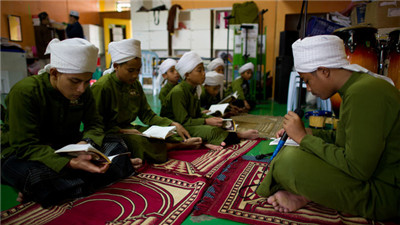(单词翻译:单击)
I expected elderly academics in a dark, dusty room lined by religious books. I thought their tales would take me on a magical journey into a kind of Da Vinci Code world. But at the Berlin-Brandenburg Academy of Sciences and Humanities in Potsdam, I find instead a young researcher in a modern office, who tells me that much of his work is tedious analysis of ancient manuscripts.
我原以为会在一间黑暗、积满灰尘、摆放着一排排宗教书籍的房间里,遇到几位年长学者。我设想他们的故事会带我踏上一段魔幻之旅,带我进入《达芬奇密码》(Da Vinci Code)那样的世界。但在柏林-勃兰登堡科学与人文科学院(Berlin-Brandenburg Academy of Sciences and Humanities)波茨坦分院,我却在一间现代风格的办公室里看到了一位年轻研究员,他告诉我他的大部分工作是分析古代手稿,非常枯燥。

I am visiting Michael Marx, co-ordinator of a fascinating project called Corpus Coranicum. The aim of the endeavour, little known outside scholarly circles, is to produce a collection of material to provide chronological commentary on the Koran and place it in historical context.
我访问的这位年轻研究员名叫迈克尔•马克思(Michael Marx),他是“古兰经语料库”(Corpus Coranicum)项目的协调人员。这项有趣的研究在学术圈外几乎不为人知,其目的是编制一批文献材料,提供按时间顺序排列的《古兰经》(Koran)评论集,并将这些评论置入历史背景中。
I’d heard that this systematic approach, involving databases and scientific manuscript analysis, was a first. I knew that much of the Muslim world might prefer it to remain that way. For believers, the Koran is a transcript of the word of God as told to the Prophet Mohammed. It is not to be questioned even in the mildest and most constructive way — and never to be doubted. “Generally speaking, in the Muslim tradition, dealing with Koranic manuscripts is considered an odd thing,” says Mr Marx, words that sound to me like an understatement.
我曾听说这套系统研究方法是个首创,它涉及建立数据库和对手稿进行科学分析。我之前就知道穆斯林世界绝大部分人可能宁愿让这些资料保持原样。对于信徒来说,《古兰经》是真主传授给先知穆罕默德(Prophet Mohammed)的话的文字记录。哪怕是以最温和、最有建设性的方式对《古兰经》提出质疑都是不可以的,而且永远不能对《可兰经》产生怀疑。马克思说:“通常来说,在穆斯林传统里,研究《古兰经》手稿被认为是件很奇怪的事。”这话在我听来似乎有些轻描淡写。
Sensitive as the project is, it’s a welcome venture that brings a tradition of critical thinking to a sacred text that is the source of great controversy in the west. In the course of its 18-year lifespan, it may well help in the understanding of Islam at a time when extremists have sullied the religion’s image. Indeed, while some Muslim scholars are sceptical of the work, others are intrigued and have been encouraging.
古兰经语料库是一个敏感的研究项目,但这一冒险值得欢迎,它为《古兰经》带来了批判性思维传统,这一宗教经典文本是西方世界大量争议的根源。在极端分子玷污伊斯兰教形象的当下,这项预计将持续到2025年的工作很可能会有助于人们理解该宗教。实际上,虽然部分穆斯林学者对这项工作表示怀疑,但其他一些对此很感兴趣,且一直支持这项工作。
Corpus Coranicum was created in 2007 by Koranic scholar Angelika Neuwirth and two of her students, one of whom is Mr Marx. It came about in an environment, following the attacks of September 11 2001, that made many in the west want to learn more about the Koran. “There’s a certain desire, a curiosity in the German academia and the larger public. Some people have questions: what does it say, where is it from, what is the context, and how to understand the text in the context,” says Mr Marx.
2007年,古兰经学者安格莉卡•诺伊维尔特(Angelika Neuwirth)带着两名学生创建了古兰经语料库,马克思便是其中一名。2001年的9/11袭击事件发生后,许多西方人想更多地了解《古兰经》,该项目便诞生在这一背景下。马克思说:“当时德国学术界和广大民众有种渴望,有种好奇。有人产生疑问:《古兰经》上都说什么了?它来自哪儿?它诞生的背景是什么?怎样在其诞生背景中理解它的文本?”
He and his colleagues are still far from providing the answers; for now they’ve been collecting fragments of Koranic manuscripts, carbon-dating parchments and studying variant readings. Though “banal and boring”, the work can also be captivating; one strand involves reconstructing the historical milieu in which the book was born.
马克思和他的同事们离找到答案还有很长的路要走,他们目前一直在收集《古兰经》手抄本的碎片,用放射性碳素测定羊皮纸的年代,研究各种经文变化。虽然这项工作“乏味而枯燥”,但也有引人入胜之处,其中一条线索涉及到《古兰经》诞生历史环境的重建。
Corpus Coranicum builds on a tradition of Koranic scholarship in the German language that was halted by the Third Reich. Indeed, it revives a pre-second world war project that was based on a treasure trove of copies of ancient manuscripts of the Koran. The scholar running the project at the Bavarian Academy of Sciences and Humanities back then, Anton Spitaler, had claimed the archive was destroyed in the British bombing. But, as detailed in a Wall Street Journal article in 2008, Spitaler had been hiding it all along. Ms Neuwirth was one of Spitaler’s pupils.
古兰经语料库基于《古兰经》德语研究传统,这一传统被第三帝国打断了。该项目实际上恢复了二战前一个基于《古兰经》古代手稿副本宝库的研究计划。当时在巴伐利亚科学与人文学院(Bavarian Academy of Sciences and Humanities)负责该项目的学者名叫安东•施皮塔勒(Anton Spitaler),他曾声称相关文档毁于英国轰炸。但根据《华尔街日报》(Wall Street Journal) 2008年一篇文章的详述,施皮塔勒一直藏着这些资料。而诺伊维尔特便是施皮塔勒的学生。


